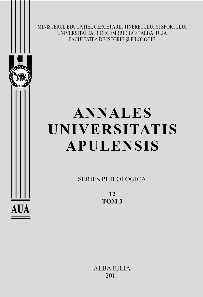Situaţii de învăţare în context informal: forme complementare de dobândire a cunoştinţelor în cadrul cursului de Etnologie şi folclor
Learning Scenarios in Informal Context: Complementary Modes for Knowledge Acquisition in the Ethnology and Folklore Courses
Author(s): Georgeta OrianSubject(s): Customs / Folklore
Published by: Universitatea »1 Decembrie 1918« Alba Iulia
Keywords: learning situation; informal context; approach through competences; ethnology and folklore
Summary/Abstract: The informational context seems to be a complementary solution in higher education, especially in the case of some objects which, due o contents and methodology, imply a practical site as well. Such is the case of the object Ethnology and Folklore, part of the curriculum of the first year students in Philology. Approaching the didactic process through competences definitely underlines the pragmatic aspect of learning, the utility of the effects of learning for individual and society. That is why it seems useful to create/challenge/ facilitate the effects of learning in an informal context (the far context) outside the formal background offered by the lecture room and the lecture itself, which would become complementary forms of acquiring knowledge and competences. Within this context, the idea of a partnership between the university and the Association TRADITION GROUP, which was set up in 2005 and is preoccupied with sustainable social, cultural and tourist development of the rural settlings and communities in Alba County seemed a solution to improve students’ acquiring information regarding folk culture both in its material aspect and in the spiritual one. The paper starts from a theoretical background formed by the speciality literature and goes on to exemplifying the concrete activities developed in workshops which paralleled the course Ethnology and Folklore during one semester.
Journal: Annales Universitatis Apulensis. Series Philologica
- Issue Year: 12/2011
- Issue No: 1
- Page Range: 395-404
- Page Count: 10
- Language: Romanian

